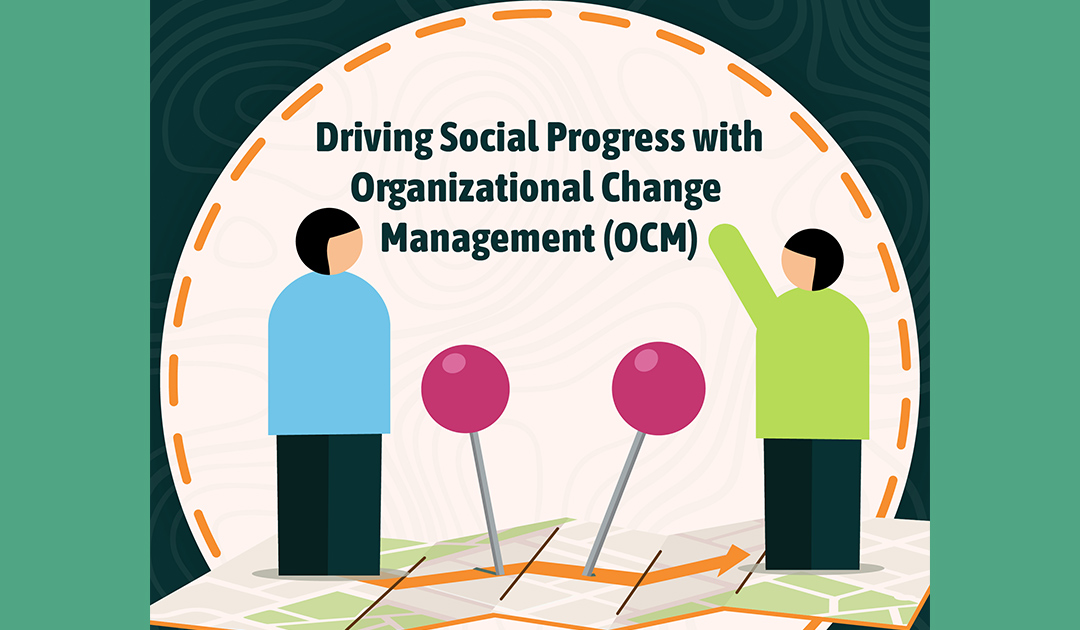In today’s rapidly evolving world, the urgency of advancing social justice and equity has become a priority for organizations committed to creating meaningful societal impact. As your institution adapts to shifting cultural, economic, and social dynamics, organizational change management (OCM) offers a structured approach to guide transformation that aligns with these core values of social justice and equity in your work environment.
By leveraging OCM as a strategic framework, you can foster an equitable, socially responsible work culture—one that not only benefits your organization but also contributes to social progress well beyond your office walls.
Organizational Change Management and Social Justice
When organizations reframe OCM to incorporate social justice, they lay a foundation for creating a positive, lasting impact that resonates beyond their immediate business outcomes.
Organizational change management is a structured approach to transitioning individuals, teams, and organizations from the challenges of the present to an envisioned future, especially in times of strategic transformation. When directed at equity and social justice goals, OCM can become a catalyst for creating an inclusive, supportive, and empowering environment where diverse perspectives thrive and improve performance on individual, team, and organizational levels.
By embracing organizational change management principles, leaders can address performance gaps and biases that often exist within organizational structures. OCM enables institutions to carefully assess existing policies, practices, and processes, identifying areas where inequities may persist and fostering a work culture that is inclusive, socially responsible, and performance-driven.
Inclusive Practices: The Foundation for Sustainable Change
For organizations committed to advancing diversity, equity, and inclusion (DEI) initiatives, inclusive practices are essential. An inclusive approach to OCM strengthens buy-in on all levels and ensures that change initiatives reflect the collection of voices of your organization. As a result, your organization becomes a microcosm of the equitable society it seeks to advance, modeling behaviors that drive sustainable change internally and externally.
Inclusivity in OCM can look like:
- Actively listening to employees: By seeking input on organizational policies and programs from different teams, your organization can develop policies that reflect a wide range of perspectives.
- Creating feedback loops within teams: Offering safe spaces for employees to provide ongoing feedback gives your organization the opportunity to adapt and refine initiatives based on real-time input.
- Developing educational programs: By raising awareness around implicit bias, privilege, and systemic inequities, your organization can foster a culture of self-reflection and allyship.
- Engaging key stakeholders in decision-making: Clearly explaining how decisions will be made and what their role in the process will be.
These methods ensure that OCM not only supports internal inclusivity but also positions your organization to uplift underrepresented voices, advocate for equity, and establish a culture of accountability.
The Role of Leadership in Socially Responsible Change
Leadership plays a critical role in advancing social responsibility and equity through organizational change management. You must actively champion DEI initiatives, setting a powerful example and establishing clear expectations for others.
Some ways effective leadership can achieve this transformative change include:
- Embedding DEI principles into organizational values: By aligning change management efforts with your organization’s core values, you reinforce the importance of social responsibility and empower employees to act in ways that support these principles.
- Holding yourself accountable: Transparency and accountability are essential to building trust within an organization. Being open about your own learning processes and demonstrating a willingness to grow sets a powerful precedent for your teams to follow.
- Providing opportunities to discuss these principles and values. By engaging individuals and teams in how their work reflects these values holds everyone accountable.
- Empowering all levels of your organization: Effective change management relies on support at all levels of the organization. By educating middle management to support DEI initiatives, you ensure that their commitment to equity is integrated throughout every level and department.
This dedication to DEI from organization leaders fosters an inclusive, informed workforce that values diversity, supports social responsibility, and remains committed to driving social change. Successful organizational change management starts with leadership. So much so that Mitch Kusy, PhD (Professor, Organizational Learning & Development, Antioch University Graduate School of Leadership & Change) has often shared his mantra with PhD students and organizational clients, “To be a leader is to teach. If you’re not teaching, you’re not leading.”
Adapting to Evolving Social Needs
The ability to adapt and respond to the complexities of social justice and equity challenges is essential for successful organization change management. Social issues are multifaceted, requiring organizations to remain nimble and open to adjusting their approaches as they deepen their understanding of the communities they serve.
Through adaptability, your organization can:
- Tailor its DEI strategies to reflect emerging insights and social trends, ensuring that its initiatives remain relevant and impactful.
- Respond to diverse needs within your workforce, recognizing that each individual’s and team’s experiences of equity and inclusion is shaped by intersecting factors like race, gender, socioeconomic status, and more.
- Drive continuous improvement by regularly assessing the effectiveness of its DEI initiatives and remaining open to feedback.
- Assess the effectiveness of these methods and make adjustments as needed to improve outcomes.
The Broader Impact: Going Beyond Your Organization
Your organization’s commitment to OCM-driven DEI efforts has a significant ripple effect on society. When organizations actively work toward creating an equitable and socially responsible environment, they contribute to broader cultural shifts that challenge system inequalities.
Organizations dedicated to transformative education and social responsibility have the potential to leverage their influence to:
- Inspire inclusivity in surrounding communities
- Advocate for equity within their industry
- Shape a workforce culture that values diversity and social justice
The presence of inclusive practices and socially responsible leadership within your organization fosters a generation of socially conscious individuals who, in turn, impact not only your organization’s performance but also on a macro-level, society through their own commitment to equity and justice.
Organizational Change Management as a Catalyst for Social Progress
Ultimately, organizational change management is more than an operational tool—it can be a powerful means of driving social impact. When grounded in values of inclusion and equity, OCM becomes a catalyst for lasting social change. By embracing diverse perspectives, fostering inclusive leadership, and staying adaptable, your organization can initiate change for a more just and inclusive society.
At Antioch University, our commitment to fostering an equitable and socially responsible environment reflects the importance of organizational change management as a vehicle for progress.
Interested in leading inclusive organizational change? Explore our PhD in Leadership and Change to learn more.






